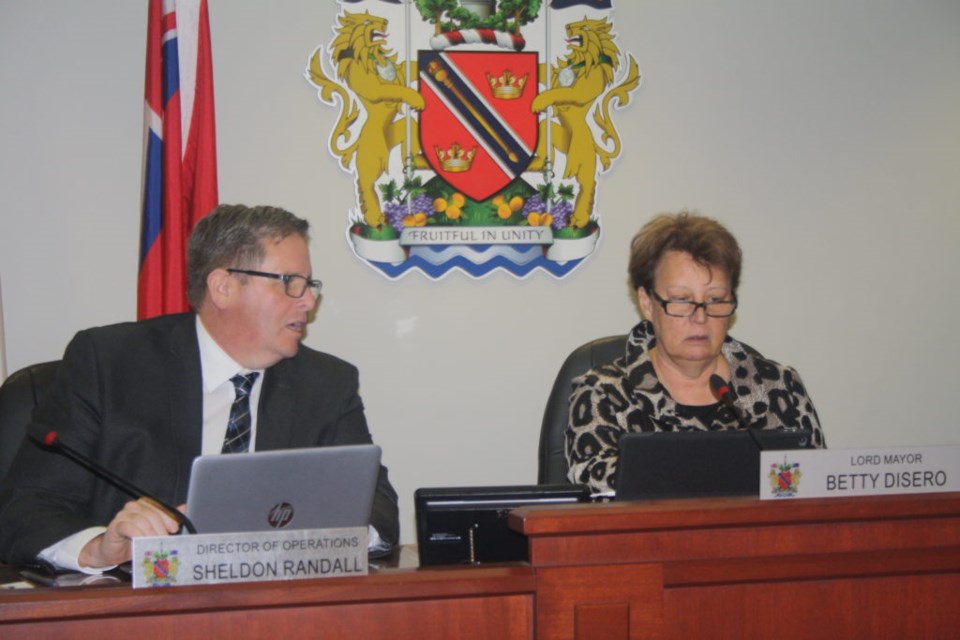
Council has approved the Town’s 2020 operating budget, but not without a struggle.
By adding another $100,000 of interest revenue to the budget, the increase in the operating levy has been reduced to 8.61 per cent, down from the 9.48 per cent increase discussed in December.
With interest that can stay in the bank “for a number of weeks,” a little longer than anticipated, says Kyle Freeborn, director of corporate services, the operating levy increase has been reduced to $1.167 million, down from the $1.267 that was before council in December.
While the 2020 capital budget was approved at a special council meeting held Dec. 16, council had decided to defer the operating budget to allow staff to look for savings.
Council also approved a special area levy for storm water of $437,199, a 2.48% increase, which hasn’t changed since the budget was presented in December.
The staff report that came to council Monday also recommended the operating budget be further reduced by $400,000, revenue from a municipal accommodation tax, that would bring the levy increase down to 5.14 per cent, but after listening to several angry people representing various accommodation sectors, and a lengthy debate among councillors, the MAT was not approved.
Had it passed, the staff report said the $400,000 could have funded operating expenses that directly support tourism, by paying for items such as fleet support and property administration; and maintenance for washrooms, Queen Street, the Court House, parks and Town facilities.
Those arguing against the accommodation tax had several reasons for their opposition, including that it would discourage longer visitor stays, which should instead be encouraged for the benefit of all local businesses, and that the tax was being suggested as a crutch to reduce taxes, not to help market tourism, as it was created to do.
The levy increase as approved represents an increase of about $92 on a residential assessment of $530,900, or $96 for those in urban areas paying for storm water.
One of the options council could have chosen, as outlined in the staff report, was to send the budget back to senior staff to look for more savings, as it did in December, a recommendation supported by Coun. Stuart McCormack.
But interim CAO Sheldon Randall said istaff would need direction as to where to look, asking if McCormack was asking for services to be cut. He suggested staff have worked hard with the audit committee to find savings. “There’s nothing left,” he said.
McCormack’s motion was lost, with the majority of councillors seeing no point in sending the budget back to staff to go over the same items they’ve been looking at since December.
Coun. Allan Bisback suggested cutting all discretionary grants, which support organizations such as the Niagara Pumphouse Arts Centre.
While asking residents to absorb an almost nine per cent levy increase, he questioned whether the Town should be funding organizations who can raise money other means.
Before there could be a vote on eliminating the grants, Freeborn reminded councillors the money to pay for them is coming out of parking reserves, so would not affect the levy increase.
Bisback also wanted to ask staff to find a reduction of $300,000 in the operating budget, and Coun. Wendy Cheropita suggested staff go back to the budget and eliminate the purchase of “one more corporate printer, or one more van.”
Randall said while the purchase of a piece of equipment could be delayed for a year, “you’re not saving the cost, you’re just putting it off.”
“During our last discussion of the operating budget,” said Coun. Clare Cameron, “every member of council was welcome to make suggestions.” Despite an 8.6 per cent increase, she said, NOTL still has one of the lowest tax costs in the region. “It seems like a fool’s errand and incredibly unproductive” to send the budget back to staff again to look for reductions, she said.
“I would respectfully suggest you take all your ideas and great suggestions to be first in line with the audit committee for 2021,” said Cameron.
“I think it’s our responsibility to keep this town operating, and to finalize this so we can get some work done.”
The budget was approved, with just Cheropita and Lord Mayor Betty Disero voting against it.
Disero said she thought they were looking for short and long-term ways to make the budget sustainable, and that didn’t happen.
“It was an 11th hour budget to get through 2020, not a long-term budget. This is the first time ever in my career I’ve voted against a budget. But I’ll support the position of council going forward, and move forward as best we can.”
The 2020 Niagara Region operating budget was approved in December, with a property tax increase of 5.92 per cent.
Correction: The article in the printed edition of The Local includes the NOTL Museum as an organization receiving discretionary grants. The museum is actually funded as a line item in the Town's budget, and received a funding increase this year as requested. The Local apologizes for the error and any inconvenience it may have caused.